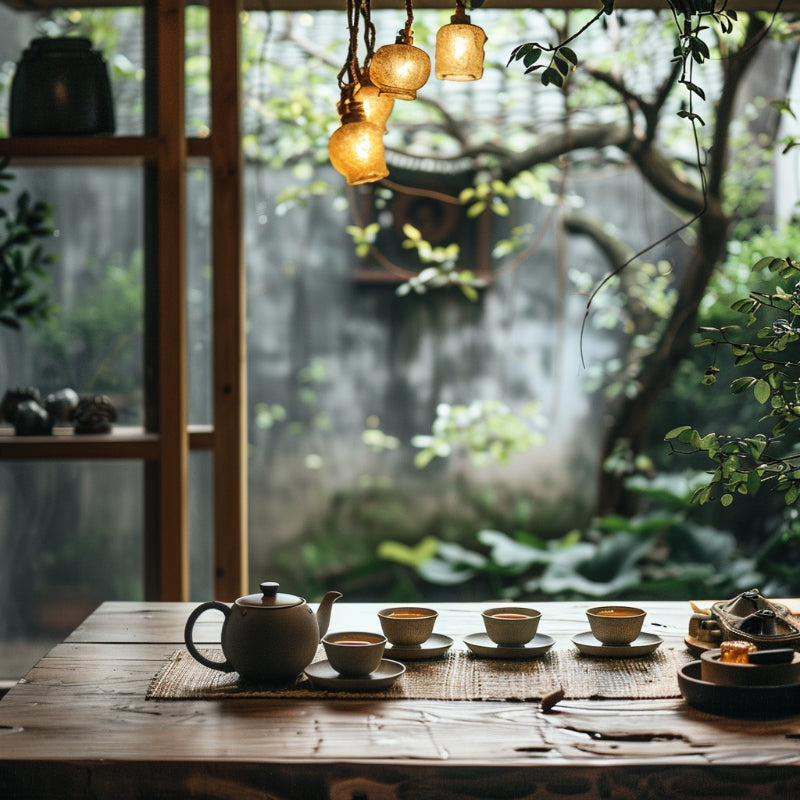As we embark on this journey of tea brewing, let us remember that the guidelines are merely a starting point – a gentle nudge in the right direction.
Welcome, tea enthusiasts, to the wondrous world of tea brewing! Whether you're a seasoned connoisseur or a curious novice, there's no denying the joy and satisfaction that comes from brewing the perfect cup of tea. In this delightful journey, we'll explore the general guidelines for steeping tea, compare the Western brewing method with the ancient art of Gong Fu brewing, and uncover why brewing premium loose leaf tea in the Gong Fu style elevates the tea-drinking experience to new heights.
The Basics of Tea Brewing: A Gentle Dance of Water and Leaves
Before we dive into the nuances of tea brewing, let's start with the basics. Whether you're brewing a delicate white tea or a robust black tea, the general guidelines remain the same:
- 1. Water Temperature: Different types of tea require different water temperatures for optimal brewing. As a general rule, delicate green and white teas prefer lower temperatures (around 175°F to 185°F), while oolongs and black teas can handle slightly higher temperatures (around 190°F to 205°F).
- 2. Steeping Time: The steeping time varies depending on the type of tea and personal preference. As a starting point, green and white teas typically require shorter steeping times (1-3 minutes), while oolongs and black teas may be steeped for longer (3-5 minutes or more).
- 3. Tea-to-Water Ratio: The amount of tea used per cup of water also plays a crucial role in the brewing process. While the general recommendation is 1-2 teaspoons of tea per cup, feel free to adjust the amount based on your preference for strength and flavor.
Western Brewing vs. Gong Fu Brewing: A Tale of Two Traditions
In the Western world, tea brewing often follows a more casual approach, with tea bags or infusers used to steep tea leaves in a mug or teapot. While this method is convenient and accessible, it may not always bring out the full flavor and complexity of premium loose leaf teas.
Enter Gong Fu brewing – an ancient Chinese tea ceremony steeped in tradition, mindfulness, and reverence for the leaf. Gong Fu brewing involves using a small teapot or gaiwan (a lidded bowl) to brew tea in multiple short infusions, allowing for full extraction of flavor and aroma. This method emphasizes precision, attention to detail, and the art of tea appreciation.

The Magic of Gong Fu Brewing: Elevating the Tea Experience
So why choose Gong Fu brewing for your premium loose leaf teas? The answer lies in the exquisite depth of flavor, the rich aroma, and the nuanced complexity that Gong Fu brewing brings to each cup. By steeping tea leaves multiple times in quick succession, Gong Fu brewing extracts a full spectrum of flavors, from the delicate floral notes of a green tea to the robust earthiness of a pu-erh.
Moreover, Gong Fu brewing allows for greater control over the brewing process, enabling tea enthusiasts to tailor each infusion to their taste preferences. By adjusting parameters such as water temperature, steeping time, and tea-to-water ratio, you can unlock new dimensions of flavor and explore the infinite possibilities of tea brewing.
Brewing Tea: A Personal Journey of Discovery
As we embark on this journey of tea brewing, let us remember that the guidelines are merely a starting point – a gentle nudge in the right direction. Brewing tea is not an exact science but rather an art form, akin to "grandma's cooking" style of preparation, where exact measurements take a backseat to intuition and personal preference.

So, go ahead, embrace your inner tea master, and don't be afraid to experiment, explore, and play with your tea brewing techniques. Whether you choose the casual simplicity of Western brewing or the mindful elegance of Gong Fu brewing, let each cup of tea be a celebration of flavor, tradition, and the simple joys of life.
With love and tea-infused whimsy,
hygge panda

